Table of Contents
ToggleKey Takeaways
- Feng shui masters assess both your home’s physical layout and its energetic qualities.
- Key areas include the main door, kitchen, bedroom, and living zones. All these influence how energy enters and flows.
- Positive energy flow depends on good ventilation, natural light, and thoughtful furniture placement.
- Small HDB flats can still achieve good feng shui through efficient use of space and minimising clutter.
- A feng shui consultant can align your flat’s energy with your BaZi chart to create lasting harmony and prosperity.
If you’ve ever walked into a home and immediately felt calm, balanced, and energised, chances are that space has good feng shui.
In Singapore, where HDB flats follow standardised layouts and architectural planning, many residents seek guidance from a feng shui master to create harmony, given the limited customisation options.
Whether you’re a young couple moving into a new flat or a family hoping to enhance relationships and prosperity, understanding what feng shui masters look at in an HDB unit can help you transform your physical space into a nurturing home.
What can Feng Shui do for HDB Flats?
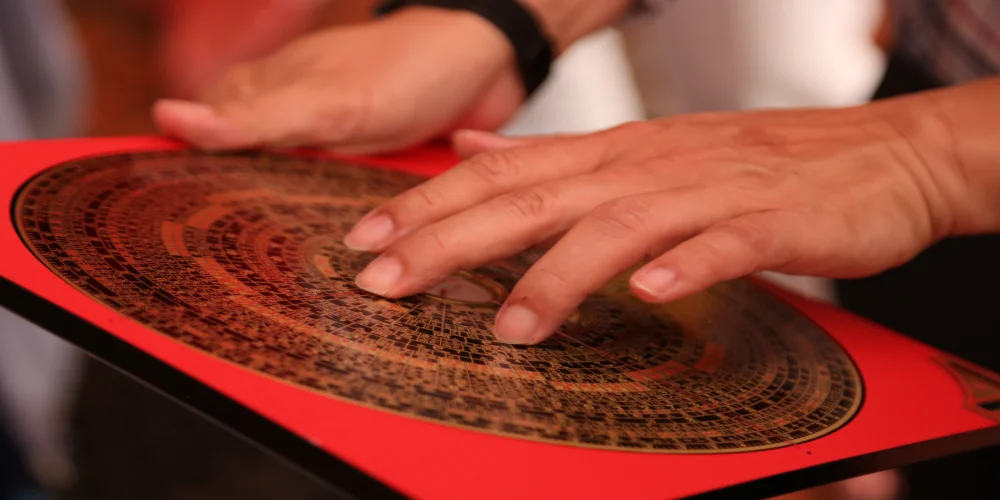
Feng shui, at its core, is about creating balance and promoting positive energy flow throughout your environment.
Even in small HDB flats, applying feng shui principles can improve health, career advancement, and family harmony. A feng shui consultant reads how energy enters and moves through your home, identifying areas of stagnant energy which may affect your well-being.
With Singapore’s high-density housing, units in estates such as Bukit Batok or Tampines often face unique challenges: overlapping functions, missing corners, or poorly lit rooms. These can disrupt the flow of Qi. The goal of residential feng shui is to ensure your home is energetically balanced so that positive Qi circulates freely, supporting good health and wealth for all family members.
The Flow of Qi Throughout Your HDB Flat: Why is it Important?
Qi, the invisible current of life energy, moves through your home just like air or water.
When Qi flows smoothly, it nourishes your surroundings, promoting vitality and clear communication among family members. However, when it becomes blocked or erratic, it can lead to stress and tension among individuals.
Various elements can affect the flow of Qi throughout an HDB. For example, if the main entrance faces the kitchen door, Qi might rush into the kitchen’s fiery energy, creating disharmony. Likewise, cluttered hallways or dim corners can disrupt the natural flow of Qi, affecting mood and motivation.
With thoughtful feng shui advice, you can adjust your home’s layout to improve energy flow and create a calm, supportive atmosphere.
Key Areas a Feng Shui Master Evaluates in an HDB Flat
The Area In Front of Your Main Door
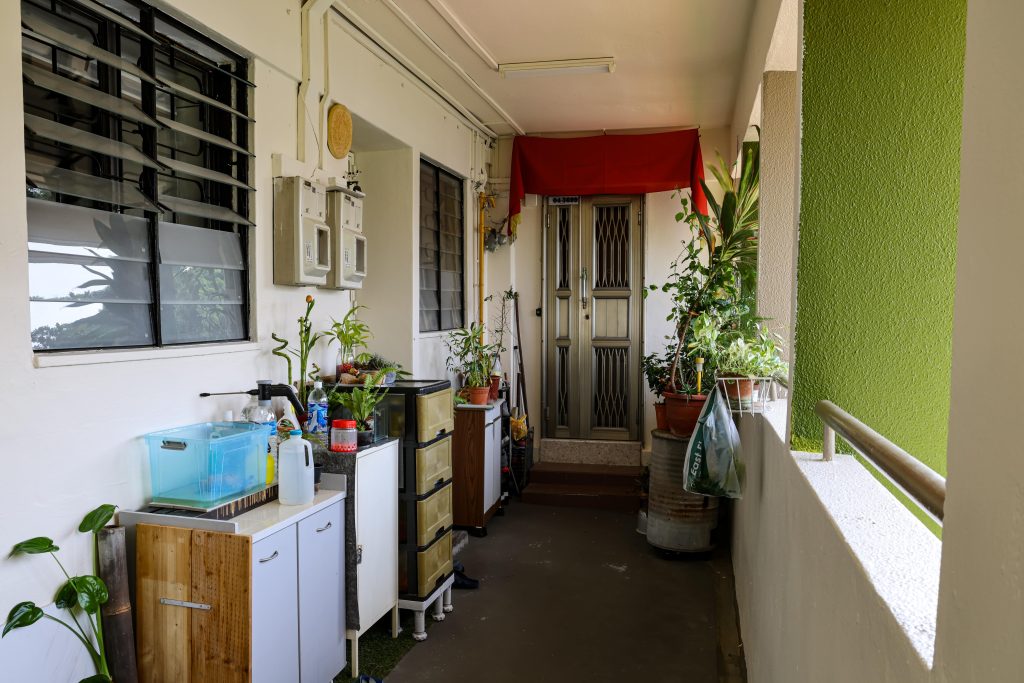
The main door is considered the mouth of Qi: the primary point where energy enters your home.
A feng shui master for HDB will observe what’s directly outside your main entrance. If the front door faces a sharp corner, lift, or rubbish chute, this could invite bad energy. Ideally, the area should be:
- Bright. The area in front of your main door should have ample lighting, ideally natural light.
- Open. The area in front of your main door should be wide and open, not cramped. This is more optimal for Qi flow.
- Clutter-free. Clutter can disrupt Qi flow. It’s ideal to maintain a clean, unobstructed front for an HDB unit.
Observing these three welcomes positive energy flow into your unit.
A feng shui consultant might recommend placing plants to enhance the flow of Qi, allowing it to circulate more harmoniously through the house. Due to their ability to gather humidity, healthy plants are positive “Yang” energy, while dead and dried plants are” Yin” energy.
In small HDB flats where the main door opens straight into the living room, plant placement can help create balance and maintain privacy without blocking good energy.
Windows and Balcony Placements
Windows act as the home’s lungs, helping Qi circulate and refresh the environment. They should be kept clean and open regularly to allow good ventilation and natural light: two key elements that promote harmony and well-being.
If your unit faces a source of negative energy, such as:
- A dried-up tree
- Sharp building corners
- Drainage lines
- Cementeries
- Construction sites
They may invite negative energy into your home.
A feng shui master may suggest sheer curtains or specific furniture arrangements to soften harsh external energy. Balconies should be well-maintained and free from clutter so that the Qi remains vibrant and unblocked. It’s also recommended that balcony windows be curtained up if it faces a source of negative energy.
Are Zones Open or Cramped?
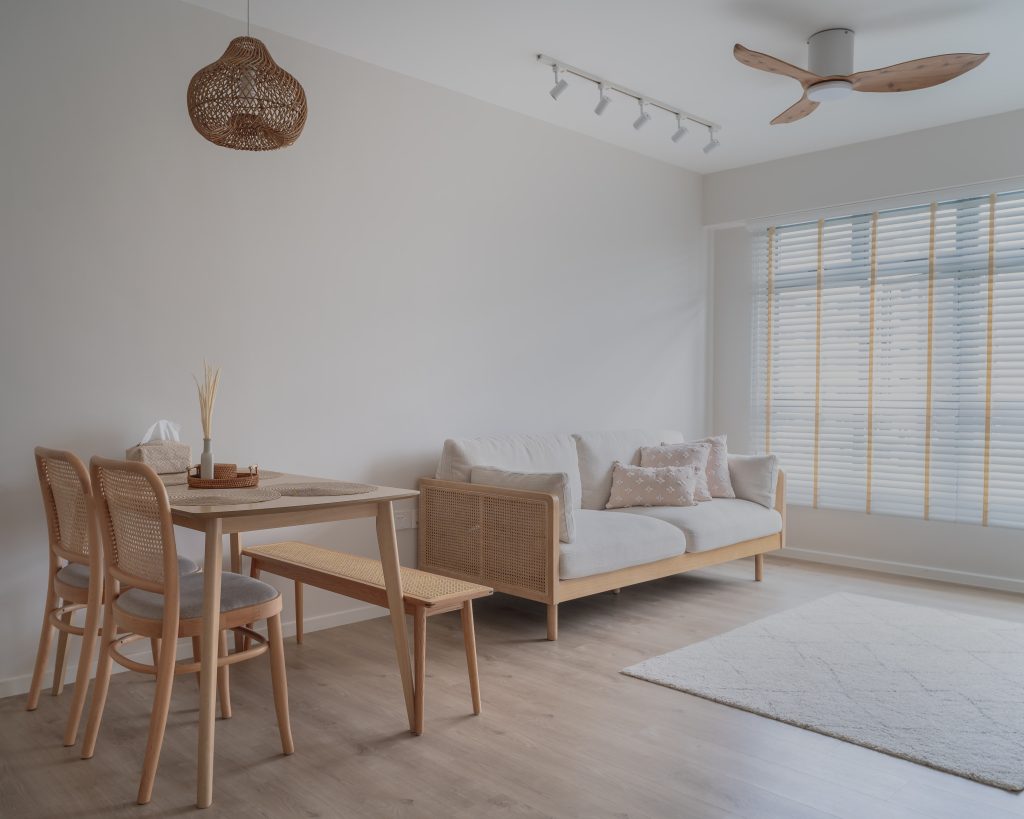
A feng shui master examines whether your layout feels open and spacious or cramped and congested.
Overcrowded furniture or blocked walkways can cause stagnant energy, while an open plan is more inviting to Qi.
Small HDB flats often face the challenge of dining and living areas overlapping, creating a congested space and clashing energies.
The solution is to use furniture and lighting efficiently to define each zone without obstructing flow. Proper zoning helps maintain good energy and ensures each area supports its intended function: whether for rest, family bonding, or work.
Bedroom Layout
The master bedroom is one of the most important areas in feng shui because it influences relationships, health, and restful sleep.
Bed placement is the most important consideration. A feng shui master checks:
- If the bed is in a “commanding position,” meaning that you can lie down on it and easily see the door to the bedroom.
- If the bed’s foot area points outward the bedroom door. If it does, it may invite negative energy into the bedroom, and into your life.
- Whether the bed’s headboard is supported by a solid wall. A solid wall represents safety and security in sleep.
- Whether the bed is underneath a beam or not. If the bed is under a beam, it may invite fatigue into your resting space.
- Mirror placement. Though mirrors serve a functional purpose, they shouldn’t reflect us while we’re in bed. At night, when your body should be in a state of stillness and restoration, that reflection creates subtle energetic agitation, leading to restless sleep
The bedroom should be a calm retreat, free from sharp edges and bright electronics. Using warm colours and soft lighting helps create a nurturing environment. Placing mirrors opposite the bed is often discouraged, as they may reflect energy too actively, disturbing sleep.
Kitchen Placement
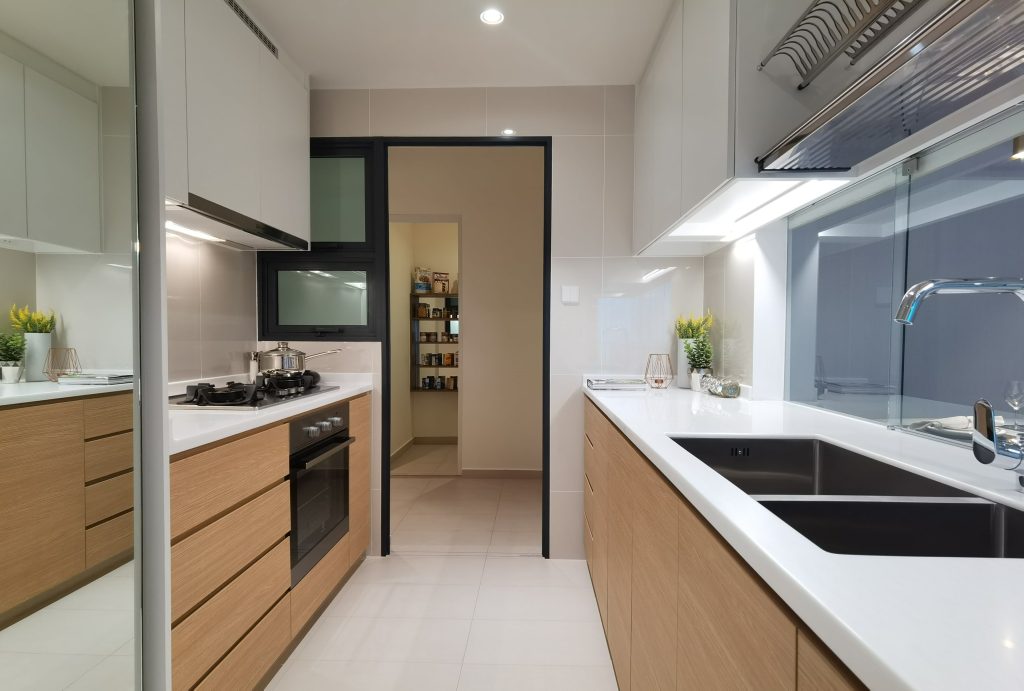
In feng shui, the kitchen represents the fire element and symbolises health and wealth.
A feng shui consultant looks at how the kitchen door aligns with other parts of the home.
- If it faces the main door or the toilet, it can cause a clash of energies between fire and water.
- For the same reason, the stove should not be directly opposite the sink or refrigerator, as these represent the fire and water elements.
- The kitchen or kitchen door shouldn’t be directly in front of the main door as well. The Qi entering through the main door may flow directly into the kitchen’s fire element, causing imbalance throughout the home.
HDB Unit Shape
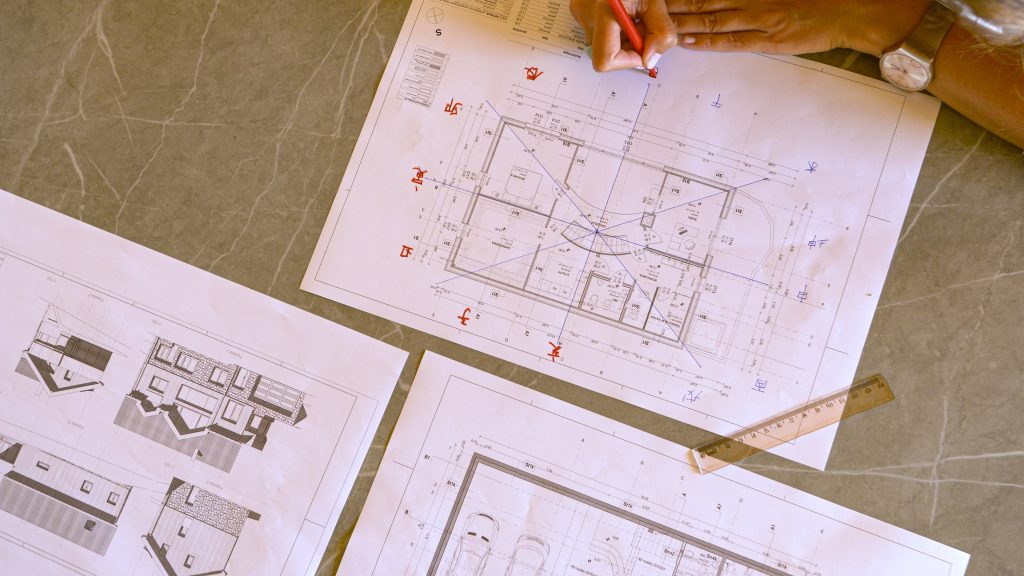
The shape of your HDB flat also affects energy distribution.
Ideally, a unit should have a regular, rectangular or square floor plan. Missing corners or oddly shaped layouts can lead to uneven energy patterns.
For instance, a missing corner in the north sector may affect career opportunities, while an imbalance in the northwest sector could impact helpful relationships.
Feng shui masters analyse the unit’s energy map to identify weak areas and recommend adjustments to promote harmony. These may include symbolic cures, enhanced lighting, or rearranging furniture to create balance.
Unit Floor: How High Up is the Unit
In Singapore’s vertical living spaces, a feng shui master also considers how high up your unit is.
- Lower floors might receive more street-level energy, which can be active or noisy, inviting more negative energy into the home. Whereas higher floors often enjoy more natural light into their home: good for Qi flow.
- However, higher floors can make units receive less energy from the ground (i.e., the Di Qi). This energy is essential to the health of inhabitants. As such, higher-elevation units may not be ideal for households with young children, the elderly, or people with disabilities.
Furniture Placement
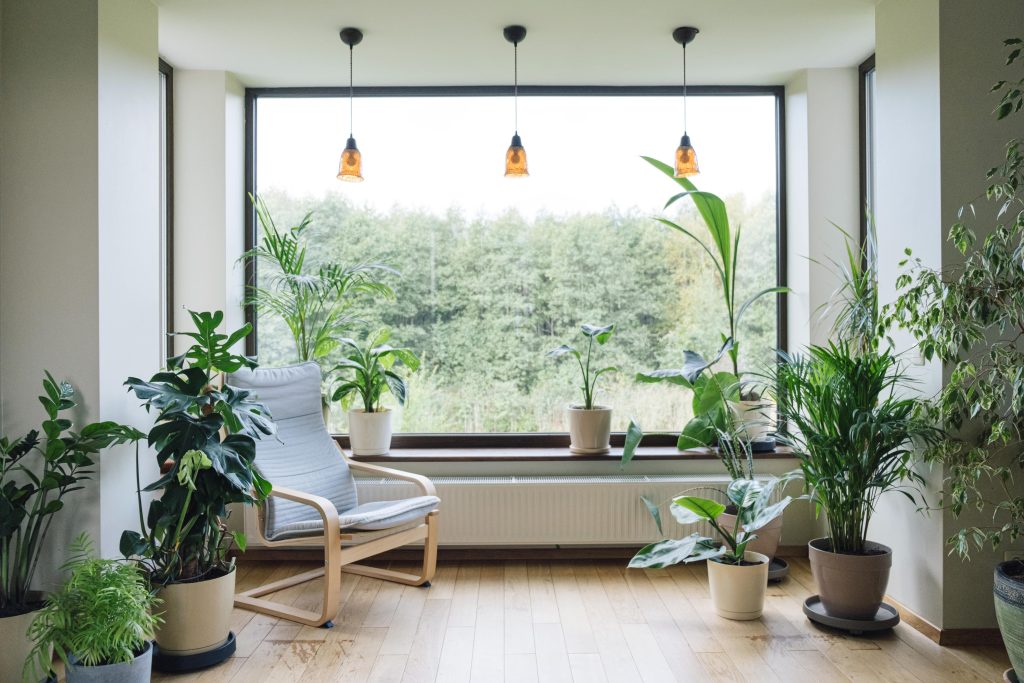
Furniture placement is key to creating harmony and balance in a home.
Strategic arrangements help guide Qi smoothly through each space.
- For example, a feng shui consultant ensures that main furniture pieces, such as sofas and beds, are positioned with a solid wall behind them to provide support and security, among many other considerations.
- Feng shui masters are also cautious with mirror placements, since mirrors are active elements. Meaning, they double and amplify energy. So, when placed opposite the bed, for example, they continually reflect Qi movement, which prevents the room’s energy from settling.
- Avoid placing large furniture directly in front of doors or windows, as this blocks energy flow and invites negative energies.
- Biophilic elements, especially well-cared-for ones, are considered Yang energy due to their ability to absorb humidity. This means they absorb positive Qi, attracting it to your home.
Instead, arrange furniture to promote clear pathways and comfortable sightlines, encouraging positive energy to circulate freely.
Unit Colour Scheme
Colours influence the home’s energy and mood.
Warm colours such as beige, peach, and soft yellow bring comfort and optimism, while blues and greens enhance calmness and healing.
A feng shui master often tailors colour choices to the occupants’ BaZi elements, aligning the five elements, i.e., wood, fire, earth, metal, and water, to create an energetically balanced atmosphere.
A well-balanced palette can elevate not just the look of your space but its underlying energy as well, supporting family harmony and prosperity.
The Occupants
Lastly, no feng shui reading is complete without considering the people who live in the home.
Each family member’s BaZi chart is unique, and a skilled shui master uses these to align the flat’s energy with individual needs. For instance, one person may need stronger fire energy for motivation, while another may benefit from more water element influence for clear communication and emotional balance.
By tailoring the environment to its occupants, a feng shui master ensures the home doesn’t just look harmonious. It also feels right on a deeper, more personal level, supporting every aspect of life.
What Can a Harmonious HDB Do for You?
When your HDB flat is aligned with feng shui principles, it becomes more than just a physical space. It turns into a source of renewal and stability. A well-ventilated, well-lit, and energetically balanced home can inspire clearer thinking, smoother relationships, and better health.
Good feng shui enhances not only your personal well-being but also your sense of purpose and prosperity.
For young couples, it sets the foundation for family harmony and career success. For established households, it reinforces balance and longevity in everyday living.
Consult a Feng Shui Master for Your HDB Flat Today!
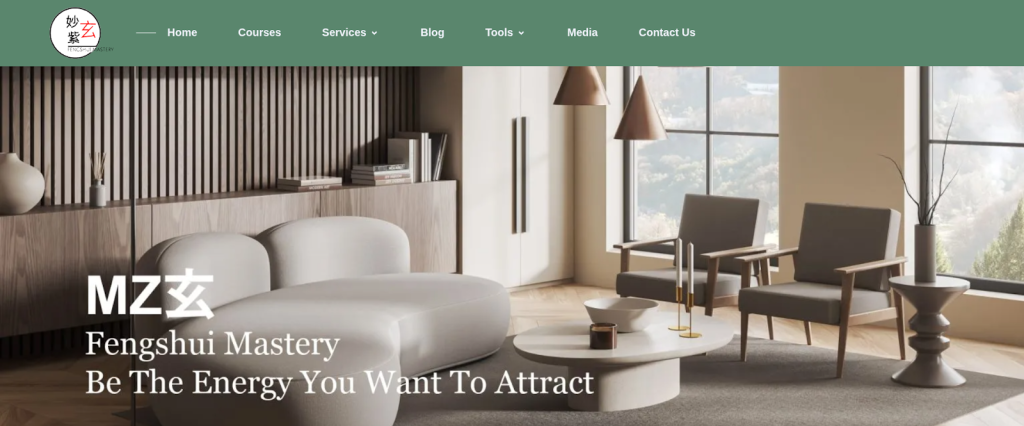
Every home has its own energy story. If you’re moving into new BTO flats or hoping to refresh your current home, professional feng shui guidance can reveal what your unit truly needs to thrive.
A feng shui master doesn’t just rearrange furniture or tell you where to place mirrors. They read your unit’s energy map, align it with your life goals, and offer tailored feng shui tips that bring lasting results.
But feng shui isn’t just for HDBs. You may also opt for a recommended feng shui master for house and landed properties, who deals with more flexible, heavier renovations.
At Feng Shui Mastery Academy, consultations combine classical feng shui with modern living sensibilities to help you create harmony between your home and your life path. Whether you want to attract wealth, promote harmony, or simply enjoy a better flow of positive Qi, a consultation can give you the clarity you need.
Book a consultation with Feng Shui Mastery Academy Today!
Frequently Asked Questions
Can A Small HDB Flat Have Good Feng Shui?
Yes. Even small HDB flats can be designed for good feng shui by ensuring clear energy flow, good lighting, and minimal clutter.
What Is Bad Feng Shui In A Flat?
Bad feng shui usually refers to blocked or misdirected energy. For example, cluttered entrances, poor ventilation, or conflicting placements of elements between fire and water.
How Often Should I Consult A Feng Shui Master?
It’s ideal to consult a feng shui master when moving into a new flat, renovating, or going through major life changes such as marriage or a new job.
Does Floor Level Really Matter?
Yes. Different floors carry different types of Qi. A professional feng shui consultant can assess which level best suits your elemental balance and lifestyle needs.

